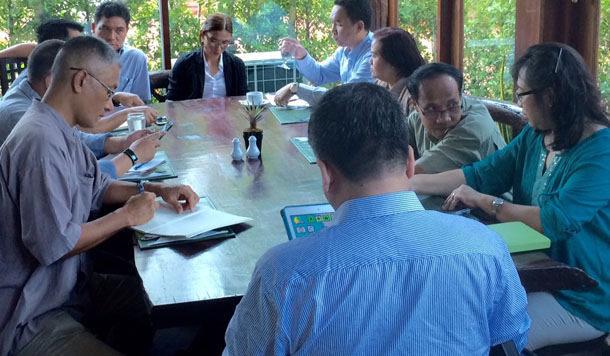CHIANG MAI, Thailand — Technical teams representing government and ethnic peace negotiators convened in northern Thailand on Thursday in anticipation of talks between the President and five ethnic armed groups next week.
Teams from the government-affiliated Myanmar Peace Center (MPC) and the ethnic negotiating bloc known as the Senior Delegation took part in the brief conference, participants said, which focused on implementation of a possible forthcoming Nationwide Ceasefire Agreement (NCA).
The agreement, now nearly two years in the making, aims to put an end to more than six decades of civil war between the Burma Army and the country’s myriad ethnic rebel groups. Negotiators have said they are nearing a deal and expect to sign the accord before a general election to be held on Nov. 8.
Written into the agreement—parts of which were published by the government for the first time on Tuesday—is a plan to commence political dialogue within 90 days of ratification. MPC’s Aung Naing Oo told The Irrawaddy that Thursday’s talks centered on facilitating post-accord dialogue.
“We have many things to do after [signing] the NCA,” he said. “We also need to form implementing committees [for ceasefire monitoring, political dialogue and code of conduct].”
Leaders of the Tatmadaw, or Burmese Armed Forces, and ethnic armed groups will convene within 14 days of reaching the accord to decide on a timeframe for the dialogue and related activities.
Framework for political discussions must be established within 60 days, leaving another 30 days until talks begin.
Salai Lian Hmong Sakhong, a member of the ethnic delegation’s technical team and representative of the Chin National Front, said only a few clarifications in terminology remain to be resolved before next week’s talks in the capital, Naypyidaw.
Representatives of five ethnic organizations are set to meet with President Thein Sein on Aug. 25: the Kachin Independence Organization (KIO); Karen National Union (KNU); Karenni National Progressive Party (KNPP); New Mon State Party (NMSP); and the Shan State Progressive Party (SSPP).
The last remaining issue to be resolved, negotiators said, is the inclusion of several armed groups that are not recognized by the government and are currently ineligible to sign the pact.
While some ethnic organizations have agreed to proceed with the accord, several others maintain the position of Burma’s main ethnic alliance, the United Nationalities Federal Council (UNFC), which does not want to sign the NCA until it is inclusive of all members.
Three of the six groups in question—the Ta’ang National Liberation Army, Myanmar National Democratic Alliance Army and the Arakan Army—proposed an independent peace deal with the government in early August, after months of deadly conflict in eastern Burma’s Kokang Region and northern Shan State.
The remaining three—the Lahu Democratic Union, the Wa National Organization and the Arakan National Council—were deemed by the government not to have sizeable enough armies to warrant designation as combatants.

















